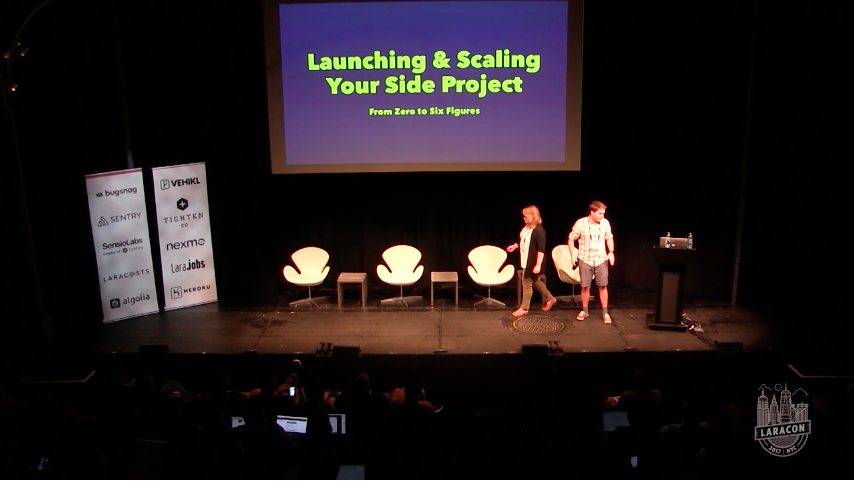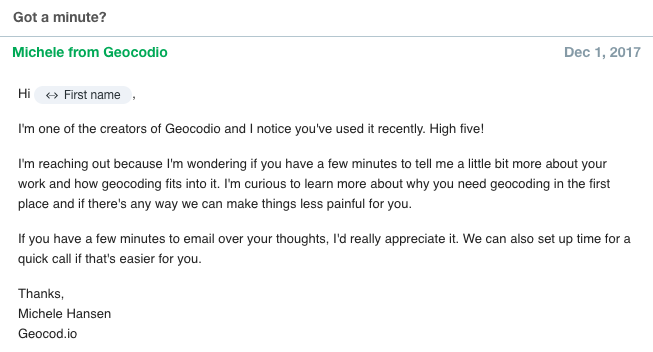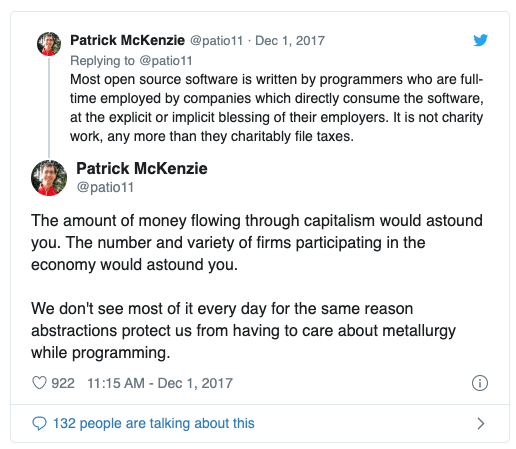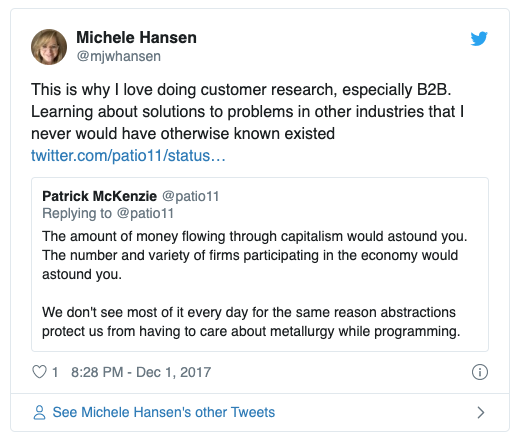This past summer, my husband/co-founder and I had the opportunity to speak at Laracon 2017 on Launching & Scaling a Side Project.

In the talk, we talked about what we’ve learned launching (…and scaling!) Geocodio, which we started as a side project in January 2014. It’s been quite the journey, and we wanted to share what we’ve learned with others to fuel their own entrepreneurial efforts. We made sure to mention that we hadn’t gone full time yet.
But now, I’m back with an update:
I went full time!
It’s only been two months so far, but I wanted to update the community on what I’ve learned so far. Warning: insanely long post follows.
1. Making the jump is the hardest part.
In October, I quit my job. I didn’t know if I was going to find a new job or work for myself, but I decided to quit without having something else lined up — which was extremely out of character for me. It freaked out a lot of people that I did this. Including me.
But I realized I desperately needed a break and something different. Mathias, my husband/co-founder/partner in everything, said at one point, “Wait, you’re the person who works full-time, runs a business for fun, and is in business school. And you’re telling me you’re going to hang out and take Nigel [our dog] for long walks all day?”
At first, I wrestled with the decision to get another job vs. go full time. I double tracked for a while: I had about a dozen conversations with friends and family on the merits of going full-time, and also had a few interviews at companies. I also committed myself to doing things that brought me joy, and split my time between conducting customer interviews, informally advising a half dozen startups on product development, and reading.
A few weeks into this, I realized that nothing made me as excited as the idea of working on Geocodio and working for myself. This thought brought me a lot of guilt and consternation.
I had a lot of fear about the instability of working for myself. What if our revenue dried up tomorrow? What would that mean for our daughter? I felt like it would be selfish and irresponsible to choose the option that would make me happier but potentially be less stable. My parents ran their own businesses for periods of time when I was a child, and the memory of the ups-and-downs came back. I also experienced financial instability at a pivotal moment in my life: my first week of college. I’m revealing my age here — something I usually try to avoid doing at all costs — but so be it: I started college in September 2008. I was “on my own” for the first time, and the economy was crashing. Everyone walked around talking about how their college funds had been wiped out. From that moment, I knew it would be an uphill battle to get internships and a job after I graduated. All throughout college, I started companies and worked several jobs simultaneously to try to avoid graduating jobless. Round-the-clock work became the norm.
Financial stability, something that was so lacking from my first few weeks as an “adult,” became a non-negotiable top priority in my life.
As my husband said, “It seems rare for someone to take the risks of an entrepreneur and, at the same time, also be extremely financially risk averse.” For years, I’d moved the goal posts on when it would be time to go full time: after we pay off this debt. After we have six months of savings. After we have this much revenue. After…
But…it wasn’t like I would be working on something without revenue or growth. Geocodio has been running for almost four years. We have a validated product and a stable and growing revenue stream. As I was hemming and hawing, our revenue was up 70%+ year-over-year, and new customers were up 50%+ over the same period.
When I described my dilemma separately to two people whose business acumen I respect highly — one a startup founder, the other an investor — they both replied with surprise that I was even considering getting a job. One of them said, in an endearingly blunt way,
“I don’t know what convincing there is to do. You already know what you want to do. Why are you asking me when it’s so obvious what you should do?”
From there, it was just a matter of making the decision, and sticking with it. I took the weekend to think about it, and decided the next week that I’d do it. I emailed the companies I’d interviewed with to withdraw my applications. I also posted on social media that I was going full time — largely as a way of holding myself accountable and keep myself from continuing to waffle. And that was it.
2. The variety is really interesting.
The autonomy and variety is the thing that hooked me in.
In any given day, I’m modeling pricing options for a new offering, writing landing pages for SEO, evaluating our insurance needs, interviewing customers, fighting with my local development environment, and doing customer support. Some days I’m even sketching out an entirely new product, separate from Geocodio.
It’s the kind of variety that’s difficult to find at an established company, and I really love needing to be on my toes and learn new things at a moment’s notice.
3. It can be cripplingly lonely.
My biggest struggle has been loneliness. It doesn’t interfere with my ability to get work done, but it does gnaw at me and forces me out of the house.
I find myself starving for interaction with other people during the day.
It feels like a strange thing to say since I’m not a solo founder. My husband is my co-founder, and for years we’ve worked on Geocodio together at night. And having a daughter means our house is full of the joyful and chaotic noise of a family in the mornings and evenings. It also feels like a strange thing to say since becoming a mother four years ago, quiet time to myself has become a precious commodity. In fact, the lack of time to myself is probably a big reason why Geocodio was launched in the first place: without the time pressure of only having an hour or two of self-directed time per day to work on it a day, we probably would have procrastinated and never gotten it out the door.
But here I am, sitting alone in my house for nine hours a day with my dog, and feeling crippled by loneliness. I miss small talk about weekend activities, grabbing someone for a coffee walk, chuckling about the news with desk mates, and bouncing ideas off of other people. I miss bringing in baked goods and seeing the smile on people’s faces when they see them, and the company soccer team I played on twice a week at my last job. I miss the strong shared camaraderie built from shared struggle and achievement. I miss having other people to struggle, laugh, and learn with.
I basically miss everything about working in an office, sans the whole working for someone else and decision-making politics part.
There was a thread on Hacker News recently about the loneliness of founders, and I posted more honest of a comment than I normally would. But, you know, I was lonely, and maybe someone would reply, and that would be social interaction. (Seriously.)

At first, I would invent reasons to go to Target or the grocery store. Now, I’ve found some better ways to deal with it, but I wouldn’t say I’m all the way there. Some days, like today, I camp out at Whole Foods (free electric car charging! good food! solid WiFi! lots of people around!). On other days, I meet up with friends who are getting their own companies off the ground. I considered joining a coworking space, but most of the people I’ve talked to who belong to them have said it isn’t worth the money.
4. My customers are really, really interesting.
One of my most productive ways of solving loneliness and simultaneously growing the business has been talking to customers.
But I don’t mean doing customer support.
Sure, I’m doing a lot of that. (Like 50-percent-of-my-time-a-lot-of-that.) But I’m also interviewing customers as well. When you’re doing customer support, you’re solving an issue. Interviews mean diving deep into their needs, goals, and frustrations.
When you’re interviewing a customer, you’re dialing in on the reason why they’ve hired a product in the first place.
Doing interviews with your customers is an enlightening window into why they’re using your product in the first place — and a window into what you might launch next to help your customers even more (and accordingly increase your revenue).
- What is it they’ve created, or are trying to create?
- What led them to need what you’ve created?
- What are they trying to accomplish in the grand scheme of things?
- What’s their process like, and where are they frustrated?
- What other products have they tried?
One of the first things I did after deciding to go full time was set up an auto-message in Intercom to customers who had made a purchase within the last 30 days.

In just a few weeks, I’ve received several dozen replies to this email and had about a dozen 30-minute or longer phone calls. I love doing customer interviews for several reasons:
- It’s motivating — I often come away with actionable things, like adding a new landing page for a use case I hadn’t considered, upping the priority of a feature we’d already captured, or planting the seeds for a new offering
- It’s gratifying — To me, there’s nothing better than hearing that something I’ve created has helped someone. Revenue is great, but the best reward is making life easier for someone else.
- It’s fascinating — It’s just cool to learn about new companies. I generally walk away with a deeper understanding of another industry that I never would have gotten otherwise. Patrick McKenzie tweeted about this earlier tonight:

I often walk away thinking about how cool my customers are and how awesome it is to be helping them solve problems I didn’t even realize existed.

5. You’re in full control.
This last, and biggest, thing is something that keeps dawning on me in different contexts. If I don’t like something, I can change it. If something is happening and I don’t like it, I have the responsibility to change it. The only person holding me back is me. See a problem? Do something about it.
One of the problems I want to solve is the loneliness problem I mentioned above. I’m starting a Meetup for founders and solo entrepreneurs to get together and work together — a WorkUp, if you will.
If you’re in the DC area, I hope you’ll join.
And if not? I’d love to chat and hear about your experiences on Twitter. Have you gone full time? Considering going full time? Think this blog post was excessively long? You can reach me at @mjwhansen.